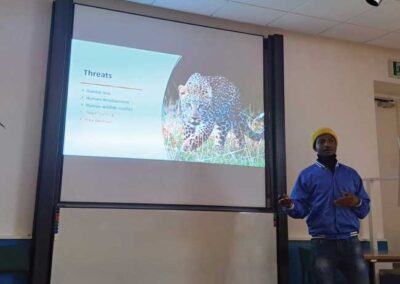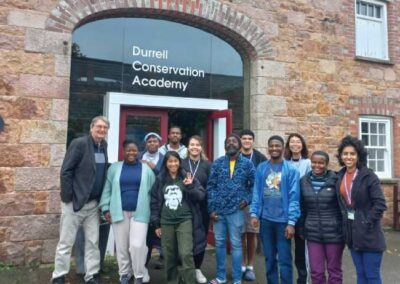TALE FROM THE FIELD
Training to save Endangered species
Rotondwa Sithagu, the EWT’s Soutpansberg Protected Area Ranger
There are few opportunities for rangers in the remote Soutpansberg Mountains to travel overseas and learn from highly acclaimed international conservationists, but I was recently fortunate enough to get this chance.
Each year, students from around the world are chosen and sponsored to attend the Durrell Conservation Academy’s DESMAN (Durrell Endangered Species Management) course in Jersey, the largest Channel Island between England and France. The academy is one of the world’s centres of excellence in conservation capacity development, and I was honoured and grateful for this once-in-a-lifetime experience.
I was the first to arrive and checked into a hotel called Dolphins – right under a medieval castle called Mont Orgueil Castle, which has been standing for over 800 years near the port at Gorey village. I had a chance to visit and see the inside of the castle as there was free entrance over the weekend. I was then moved to Durell Hostel for the remainder of the scholarship period. The first week was mainly introductions to the facilities and getting to know the staff and the team.
When school commenced, we had a week of learning facilitation and communication skills led by Dan Craven, a volunteer manager for Durrell. The course was designed to equip us with skills to facilitate meetings and workshops, develop and coordinate teams, deal with internal and external conflict, and improve our teamwork skills. At the beginning of October, we were taught how to effectively plan and manage conservation projects by applying the Conservation Standards, conducting a participatory situation analysis, identifying conservation strategies, and developing a strategy-oriented project plan. In November, we learned about population monitoring techniques such as distance sampling, camera trapping, and radio-tracking, which are especially valuable for our projects researching the species and ecology of the Soutpansberg mountains. We also learned how to integrate conservation and rural development, conservation education, and communication techniques, and this struck close to home for me because there is still a major need to teach young community members about the animals found on the mountain and the importance of the mountain in terms of what its ecosystems provide.
I also had a chance to present a project proposal to Durrell staff about our work in the Soutpansberg and what I would like to implement involving assessing the effects of snaring on Leopard ecology in the Soutpansberg and how to address this issue holistically, which involved engaging with local communities. The proposal was well received despite most of the audience not being from South Africa or my part of the country.
The highlight of my trip was the opportunity to live with and be taught by Carl G. Jones, one of the leading experts in zoo conservation. He was mentored by a renowned conservationist and author, Gerald Durrell, after whom the academy is named. I learned much from him, including principles of species recovery, understanding population limiting factors, and ecosystem restoration. It was a life-changing experience for me and one I intend to put into practice to build the capacity of my colleagues and community to protect our magical mountain.
Thank you to the Jersey Government and the Durrell Academy for awarding Rotandwa this once-in-a-lifetime opportunity.


